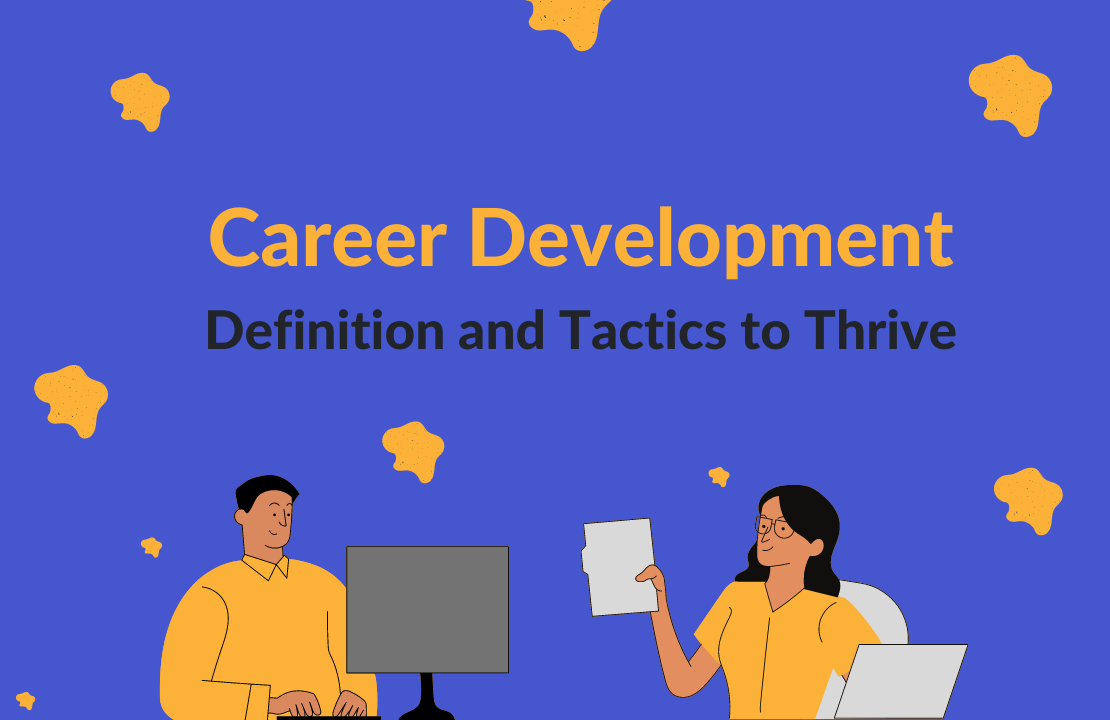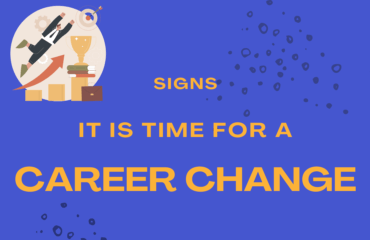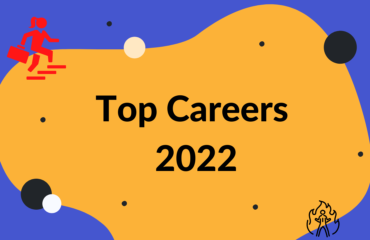Table of Contents
How easy is it to manage your career as a professional? How much effort should you exert to step up the career ladder or make a transition to a more fulfilling job as a senior? Unfortunately, there is no simple answer to these questions as every career path is unique and special for each of us. However, there are certain tactics to practice to grow professionally and chase new work opportunities as they arise.
In this guide, we will focus on the principles of career development and explore how employees and candidates can leverage their career planning to land their dream roles. You will learn the most essential phases of career development, which factors influence it, and how to approach your career goals successfully. Finally, you will find out how to seek new challenges working for businesses that don’t offer official career development programs to their workforce.
What is career development?
First off, let’s start with a brief definition of our core topic. Career development is the process of exploring and understanding your career capabilities. It entails the navigation of different job options and the tactics a professional adopts to adjust to them, such as skill development.
Overall, it’s a dynamic procedure that unfolds as people grow professionally and seek occupations that fit them more. Here’s an example: George is a marketing specialist with five years of expertise and is now ready to move to a managerial position. How can he make this happen? And that’s where career planning comes in to construe that goal.
The importance of career development planning
Once a professional has decided to make a career change, they should look for tangible ways to implement this goal. In brief, a career development plan is the means to career growth, a list of actions that require conscious effort to find the resources they need to develop in the long run. Besides, it’s best to figure out how harmoniously this objective is aligned with the rest of their future career and personal plans.
So what can George in the example above do to make the work change he desires? First off, he can set up a meeting with his manager or the HR team to discuss his plans. Then, he can attend leadership training to gain theoretical knowledge in that area. These are just a few examples of the steps he can take to meet his goal.
The five stages of career development
There are many classifications in career development theory, indicating the major shifts we are going through in our work lives. Below, we present a well-known career development model:
1) Exploration
This is the stage during which we make our first career choices straight after college or university. As young graduates, we try to decide what our first roles will be, which in most cases, are relevant to our studies. Of course, exploration as a process can take place in other career phases as well, especially when we are about to make a career shift. We begin to experiment with different choices from scratch and try to re-evaluate what’s best for us.
2) Establishment
In this stage, graduates enter the job market for the first time, usually as interns or entry-level employees. They gain their initial work experiences and sharpen important skills that will be crucial throughout their careers, like teamwork or task management. They also understand what type of duties they prefer to perform and where there is room for improvement.
3) Mid-career
There are many variations in this stage. Some professionals may experience a more linear growth by excelling in a specific field and stepping up the ladder from junior to senior. But nowadays, this is not the most common scenario. Many employees may seek new challenges even in mid-career stages and land new roles. They can achieve this by utilizing their transferable skills or receiving extra training.
4) Late-career
During this phase, the professional is usually in a stable state in their career, enjoying everything they have earned so far. Many of them hold leadership or consulting roles and feel confident in what they do. They are usually not required to learn skills from scratch, as they have gained valuable experience in the previous years.
5) Retirement
Now the professional is ready to retire. They review their achievements and try to transfer their knowledge to their younger counterparts. It can become a rather emotional stage, but hopefully in a positive way.
Factors that can affect career development
Apart from an employee’s interests and ambitions, there are additional factors that can influence their career development plans. Here are some critical ones:
- Personality: Some of our personality traits can influence our career preferences and choices. Let’s take introversion and extraversion as an example. An extrovert is more likely to choose a career in sales or PR, while an introvert may feel more comfortable with a writing role that requires less interaction with other people.
- Financial Resources: A professional’s financial resources may affect their career development both positively and negatively. Some career options are more costly as they require extensive training. Thus, access is not equally available to everyone unless they earn a scholarship or request a student loan.
- Personal commitments: When a professional decides to start a new chapter in their lives, such as creating their own family, this might affect the type of work they can commit to. People may seek more flexible job positions to be able to find the work-life balance they need. Thankfully, in recent years, businesses have increased perks such as maternity/paternity leave and have started introducing more flexible arrangements to cater to employee needs.
- Physical and mental health state: Disabilities, physical impairments, and mental health conditions can also have an impact on career decisions. This phenomenon will hopefully decline in the future as organizations increasingly take diversity and inclusion initiatives. Many employers try to provide equal employment opportunities, creating accessible and inclusive workplaces.
- Age: Our age, and mostly how we perceive it, can also play a role in the career choices we make. Sometimes we may think that we are too young to apply for a certain role or too old to change career paths. But in most cases, this is subjective and should not define our career development.
Career development tactics to thrive
Now that you have a better understanding of career development stages and which factors can influence them, let’s move to some practical tips. If you’ve decided to make a new step in your career, these will enable you to reach that goal successfully. And remember, sometimes you’ll need to readapt your plan based on new conditions, but this is also a part of the process.
1) Adopt a growth mindset
Your career development attempts will not always be easy to handle. We are all prone to failure, and this may temporarily take us away from our goals. However, resilience is built on drawbacks, and without them, we will never find what we are made of.
Developing a growth mindset will be game-changing for you. If you believe that failure is a necessary part of your growth and mistakes are opportunities to learn, then you’ll recover from them fast and stronger. In contrast, a fixed mindset, believing that someone’s skills are innate and not malleable, will most likely harm your self-esteem and growth.
2) Set long- and short-term career goals
Our career goals can be divided into short-term and long-term. The first is usually readily accessible in terms of resources and time, while the latter requires more planning to achieve. Acknowledge which type of goal you’re setting each time and plan your steps accordingly.
If the goal you’ve set is long-term, for example, you want to pursue a C-Suite role, realize how your strengths and talents align with this objective and what skills you should learn to approach it. You can also decompose it into sub-goals so that it’s easier to measure your progress going forward. Applying the so-called SMART framework will enable you to put things into perspective and manage the process effectively.
3) Identify your transferable skills
Sometimes we may overlook how useful some of our abilities can become for diverse roles and responsibilities. Our transferable skills can define our career development as long as we recognize and make good use of them. But how can you spot them sufficiently?
First off, you can write down your top ten strengths in the form of a list. Then, try to think abstractly about how these abilities will contribute to your personal growth. You can also ask your colleagues and friends for feedback on how to utilize your existing skill set to meet your career development goals.
4) Seek new work challenges
You cannot grow stronger as a professional if you do not get out of your comfort zone. This is even more crucial if you’ve operated in a specific field for a long time and you wish to make a shift in your occupation. In the beginning, it may feel uncomfortable, but it will be worth it.
So once you find a challenge you want to pursue, talk to your manager about it and get some new responsibilities at work. Thus, you’ll sharpen the skills you want, which can even lead to a new role or promotion. Or you can even self-educate via books and webinars to enhance your resume.
5) Monitor your progress
As aforementioned, career development requires thorough planning and mindful goal-setting. And especially, in the case of long-term goals, you cannot leave this process out to luck. Instead, you should find ways to keep track of your progress to ensure maximum results.
One easy method to do this is through journaling. Write down both your short- and long-term targets and how you plan to reach them. This will give you more clarity down the road and will remind you of the next steps at critical times. You can also write positive affirmations to keep yourself motivated against all odds.
6) Build a strong network
Professional networking can turn into a compelling practice for your career. It enables you to exchange ideas with professionals in your field and ask about their own experiences. Plus, they may act as points of contact for new work opportunities and even refer you for open roles at their organizations.
Networking happens both online and offline. Start by communicating with your connections on LinkedIn or attending live events to meet new people. Keep in mind that networking is a skill by itself. Learn to practice and excel in it, and you will gain a lot in return.
What to do if your employer doesn’t offer a career development program
Many businesses invest in career development programs and offer employees opportunities to obtain new responsibilities based on their interests. Organizations approach this in multiple ways, but mainly through encouraging team leaders to do regular 1:1 checks with their employees to capitalize on their ideas and progress. HR can also contribute to this process by providing private sessions to employees that request it. But what happens if there are no similar incentives at your workplace? Here’s what to do:
1) Find a mentor
Having a role model to look up to can elevate your career. Seek an expert from your network with inspiring employment history and ask for their advice. This person can also be a leader in your organization, so if you have trust in them, don’t hesitate to reach out. Prepare a list of questions and concerns to share with them, and they may be more than willing to help you out. They might also have tips on how to get promoted inside the organization.
2) Get relevant training
If the organization you work for offers training opportunities, make the most of this benefit to learn new skills that will move you forward. But if there is no such perk, you can seek learning solutions in external sectors. Thankfully, platforms like Coursera or FutureLearn offer excellent courses at affordable prices that are available globally. Plus, many websites allow you to start a course for free, which is very handy for professionals in exploration mode.
3) Request career coaching
In some cases, the practices we’ve shared above are not sufficient. People can get stuck along the way and find it difficult to make career decisions. This could occur in all career development stages as our occupational choices can be affected by other life events, as well. So if you find it hard to remove those obstacles by yourself, you can always book a consultation with a professional career coach for support.
To sum up
Career development is a complex and dynamic process. Every professional has a unique career journey and a special way to fulfill it. So every time you set a specific goal, you should plan your moves carefully to achieve it. Therefore, if you’re on the verge of a career shift, make sure to craft a solid plan and set goals that align perfectly with your strengths. And if you follow the above tactics at crucial moments of your career, you’ll flourish by all means. Just remember to adapt to new situations and learn from your mistakes – there is nothing more valuable than that.
References
2) Corporate Finance Institute. What are SMART goals? Available at: https://corporatefinanceinstitute.com/resources/knowledge/other/smart-goal/
3) Great Place To Work, 2021. Why Is Diversity & Inclusion in the Workplace Important? Available at: https://www.greatplacetowork.com/resources/blog/why-is-diversity-inclusion-in-the-workplace-important
4) Idealist, 2018. 3 Journaling Habits to Help Your Career. Available at: https://www.idealist.org/en/careers/3-journaling-habits-help-career
5) Mindset, 2020. Growth Mindset vs Fixed Mindset: How what you think affects what you achieve. Available at: https://www.mindsethealth.com/matter/growth-vs-fixed-mindset
6) Skills You Need. What Are Transferable Skills? Available at: https://www.skillsyouneed.com/general/transferable-skills.html











